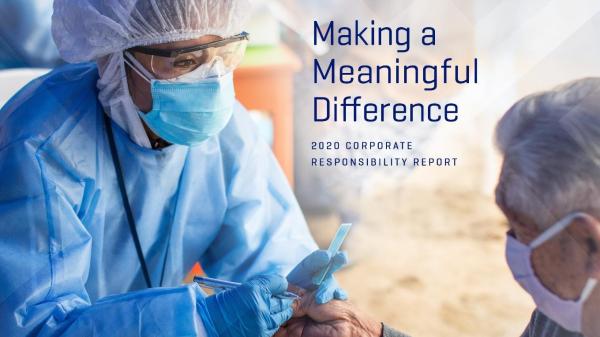Confronting Coronavirus: Managing Severe Cases of COVID-19
Jean-Louis Vincent, M.D., Ph.D., a world-renowned critical care specialist at the Erasme Hospital, shares his insights with fellow intensivists on managing severe cases of COVID-19.
Managing patients with severe cases of COVID-19 is proving to be a challenge in China. Recent data from the Chinese Center for Disease Control and Prevention shows that COVID-19 led to death in 2.3% of patients, making it 23 times deadlier than a typical influenza.
COVID-19 is first and foremost a respiratory disease that can progress from pneumonia to life-threatening respiratory distress in severe cases. Early data suggests that 10-20 percent of cases are likely to be severe enough to require ICU admission.
We recently spoke with Jean-Louis Vincent, M.D., Ph.D., a world-renowned critical care specialist at the Erasme Hospital, Université Libre de Bruxelles and past president of the World Federation of Societies of Critical Care Medicines and the European Society of Intensive Care Medicine, among others.
Q: What challenges related to the coronavirus are impacting ICU physicians and nurses?
A: First, our thoughts are with our Chinese colleagues as they work to treat patients in the most challenging of situations. We know that the ICU team can be personally impacted by these challenging circumstances. Some staff may be ill themselves. They may also be experiencing psychological decompensation given the trauma that is going on around them. Some may have family members who are infected with the virus. All of this means that the number of people available to work in the ICU may be lower than usual, adding to the challenges. Those who are treating patients must protect themselves with the appropriate protective clothing and gloves and that makes working miserable. While absolutely necessary, these added precautions make it harder to do the small, everyday things that we are used to doing. It is a real challenge for our Chinese colleagues right now. Clinicians in the rest of the world need to be ready for this environment, and we need to talk about it with our ICU teams now, before the situation is in front of us. That’s what we do in Brussels, so that we are prepared should we need to treat cases like this.
Q: There are reports from clinicians in China that COVID-19 is causing an aspecific respiratory syndrome and a general inflammatory response in patients. Based on your expertise, what is the general approach to managing these patients?
A: As we know, we do not have effective anti-viral agents to treat this patient population. There may be some possibilities in the future, but right now we cannot make a case for an anti-viral agent. So, the general approach to treating a severe case of COVID-19 should be on organ support. The main organ failing in these patients is the lung, so we expect to see bilateral lung failure resulting in acute respiratory distress syndrome (ARDS). ARDS occurs when fluid builds up in the air sacs within the lungs, reducing the oxygen that can reach the bloodstream and organs. Treatment for ARDS should initially be focused on oxygen therapy and C-PAP to maintain gas exchange. Patients need to be intubated rapidly and may also need ECMO – extracorporeal membrane oxygenation. Hemodynamic management is also important. We must limit fluid administration while maintaining cardiac output and oxygen delivery. These patients may need some intravenous fluid, but we should avoid fluid overload. Some of these patients may need blood transfusions or dobutamine to maintain sufficient blood flow to the organs. Some patients will be in genuine shock, so noradrenaline should be added to maintain sufficient blood pressure. Excessive vasoconstriction should also be avoided. It’s not just treatment of hypotension – it is the restoration of vascular tone that counts. Antibiotics may need to be given later as soon as there are signs of a bacterial infection. We know that in these conditions, many patients will develop lung infections due to bacteria. So far, it seems to be Gram-negative than Gram-positive organisms in patients with COVID-19.
Q: You recently published a paper in The Lancet with Professor Ronco on organ support therapy within this patient population. Could you share your thoughts on organ support outside of the lungs?
A: Some of these patients will develop acute kidney injury (AKI), or renal failure to the point that they will require renal replacement therapy. Usually, that comes in the form of hemofiltration via continuous renal replacement therapy. We may consider some other extracorporeal therapies, especially in the context of removal of inflammatory mediators. All of these options are what we call today ECOS, or extracorporeal organ support. Clinicians should be thinking about how to use ECOS in the best possible way to treat these patients. We need to have the technology available and we need to use this technology appropriately.
Q: What role do inflammatory mediators, including cytokines, have in treating patients with COVID-19?
A: What we know is that this disease causes an overwhelming inflammatory response in the body and this results in immunosuppression. It seems like after one week we may be able to identify those patients who will improve and those who will develop severe immunosuppression. Severe immunosuppression is likely to lead to severe infections and possible mortality. There is a case to be made to try to reduce that inflammatory reaction, because we know that the immunosuppressive phase is actually induced by the previously pro-inflammatory state. Also, giving corticosteroids is probably not a good idea because you do not want to give a therapeutic medication that may reduce the host response in the following days, and that is something to worry about. I don’t think there is any place for anti-inflammatory agents in these patients.
Dr. Jean-Louis Vincent has served as a paid consultant for Baxter.


